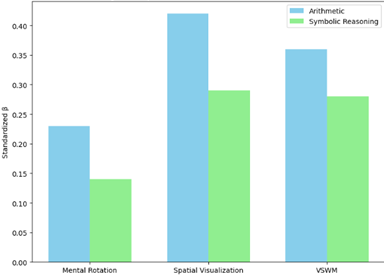Developmental Trajectories of Spatial Skills and Their Predictive Role in Early Mathematics Achievement: A Longitudinal, Person-Centered Study of Diverse Learners Aged 3 to 7
Keywords:
Spatial Skills, Mental Rotation, Spatial Visualization, Visuospatial Working Memory (VSWM), Early Childhood, Longitudinal Study, Growth Mixture Modeling (GMM)Abstract
Spatial skills, including mental rotation, spatial visualization, and visuospatial working memory (VSWM), are increasingly recognized as foundational for mathematical development in early childhood. However, limited longitudinal evidence exists on how these skills evolve across time and contribute to math performance in diverse populations. This study employed a multi-wave longitudinal design with 612 children aged 3 to 7 in Pakistan to investigate: (1) developmental trajectories of core spatial abilities, (2) demographic and cognitive predictors of spatial growth, (3) the relationship between spatial development and math outcomes at age 7, and (4) distinct developmental profiles using growth mixture modeling (GMM). Results revealed consistent linear improvements in all spatial domains, with SES and verbal working memory significantly influencing both intercepts and slopes. Spatial visualization and VSWM emerged as robust predictors of arithmetic, number line estimation, and symbolic reasoning, independent of intelligence and SES. GMM identified three profiles—Rapid Improvers, Moderate Learners, and At-Risk Children—differentially associated with math outcomes. Moderation analysis showed that verbal working memory strengthened the link between spatial visualization and symbolic reasoning. Findings underscore the critical role of early and accelerated spatial development in supporting mathematical achievement and call for targeted interventions, particularly for children from socioeconomically disadvantaged backgrounds.


